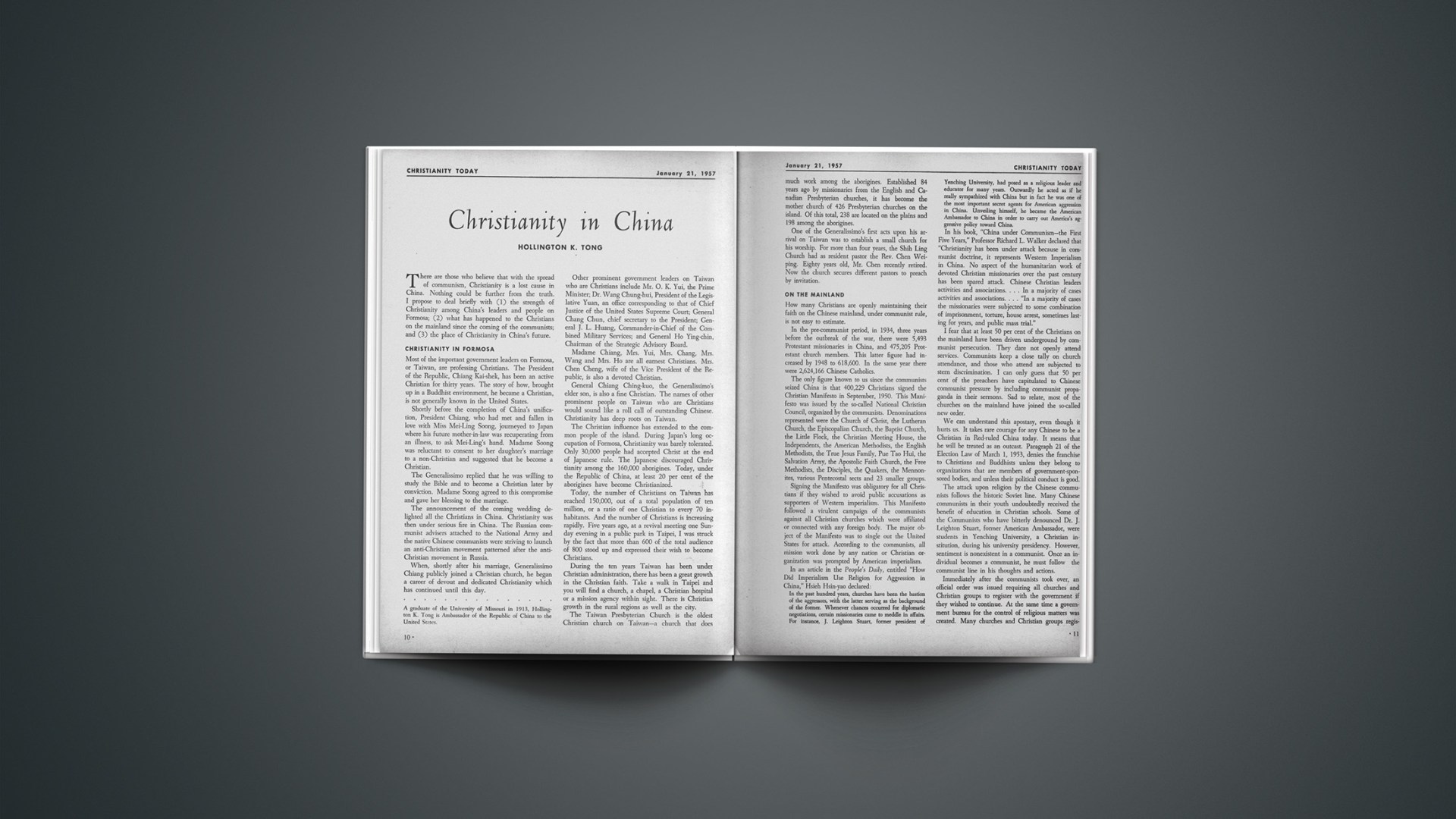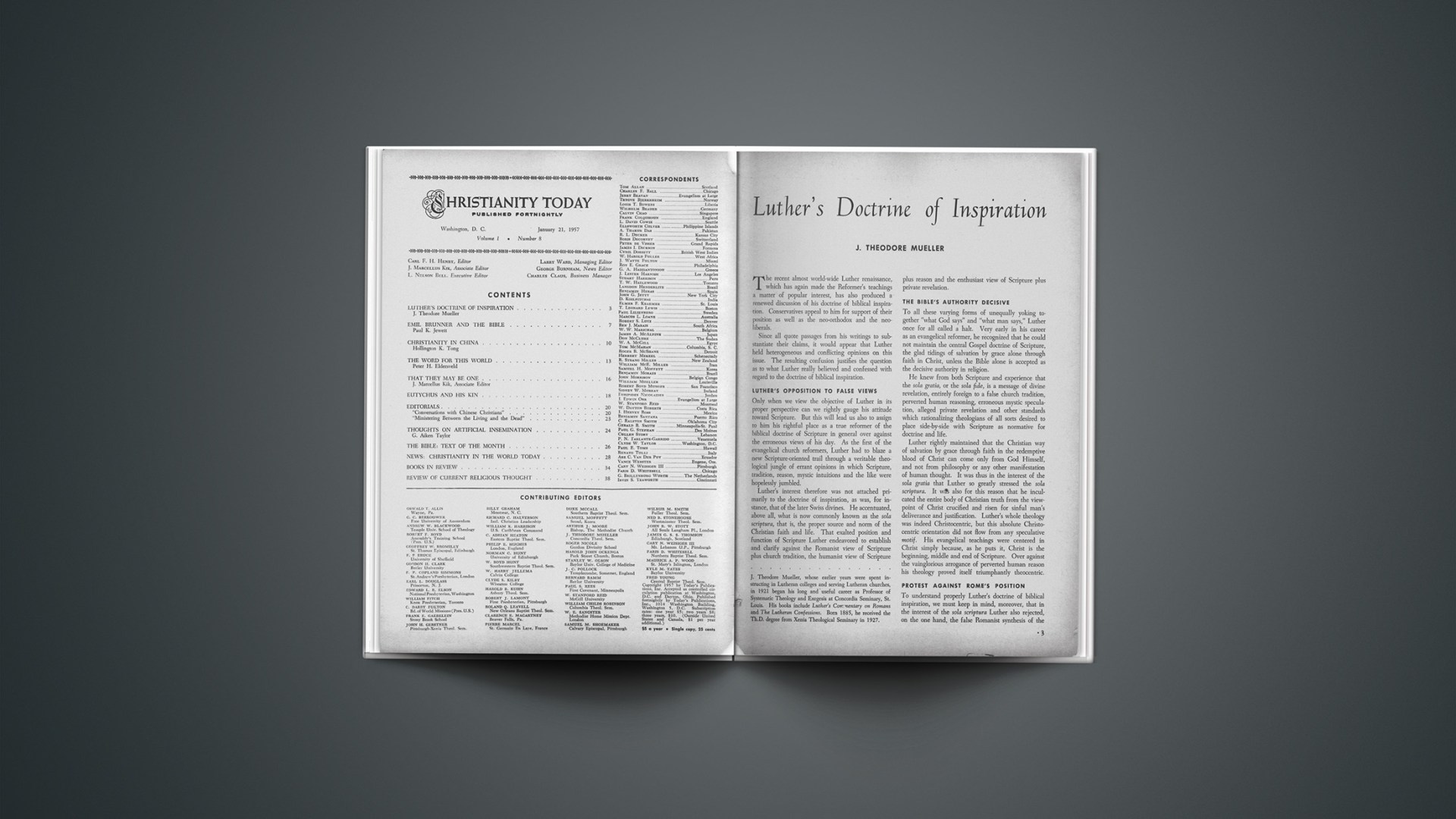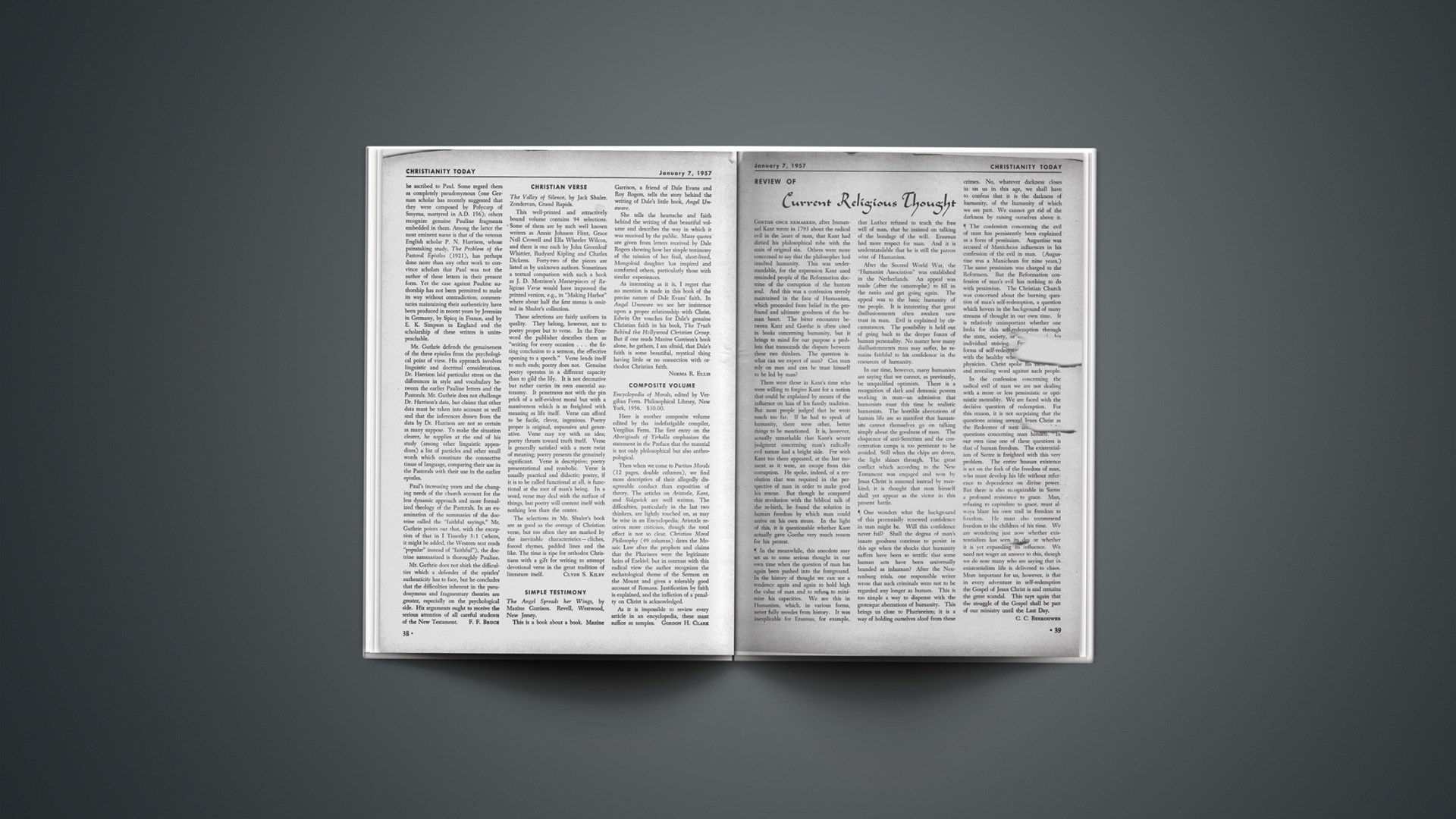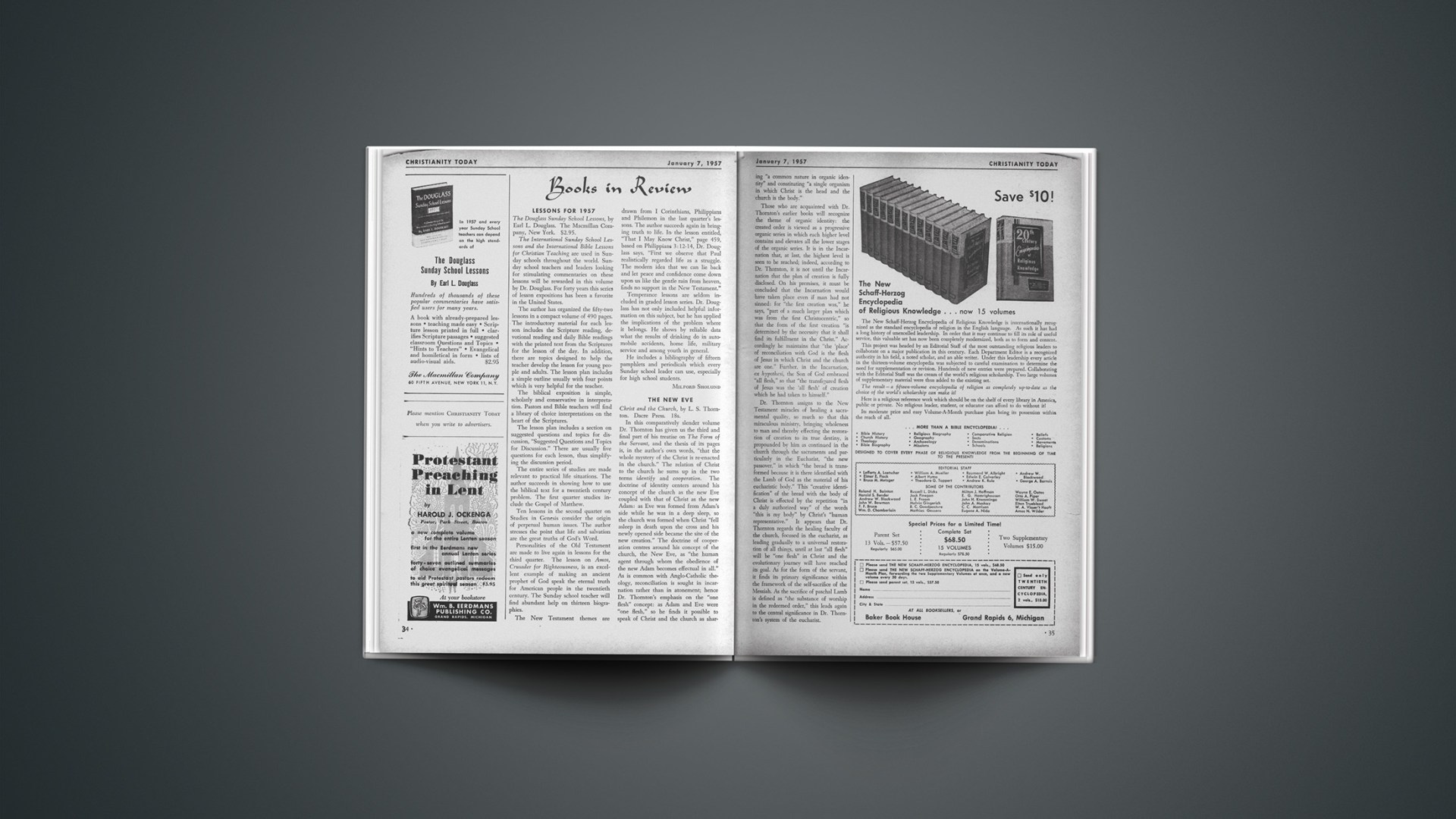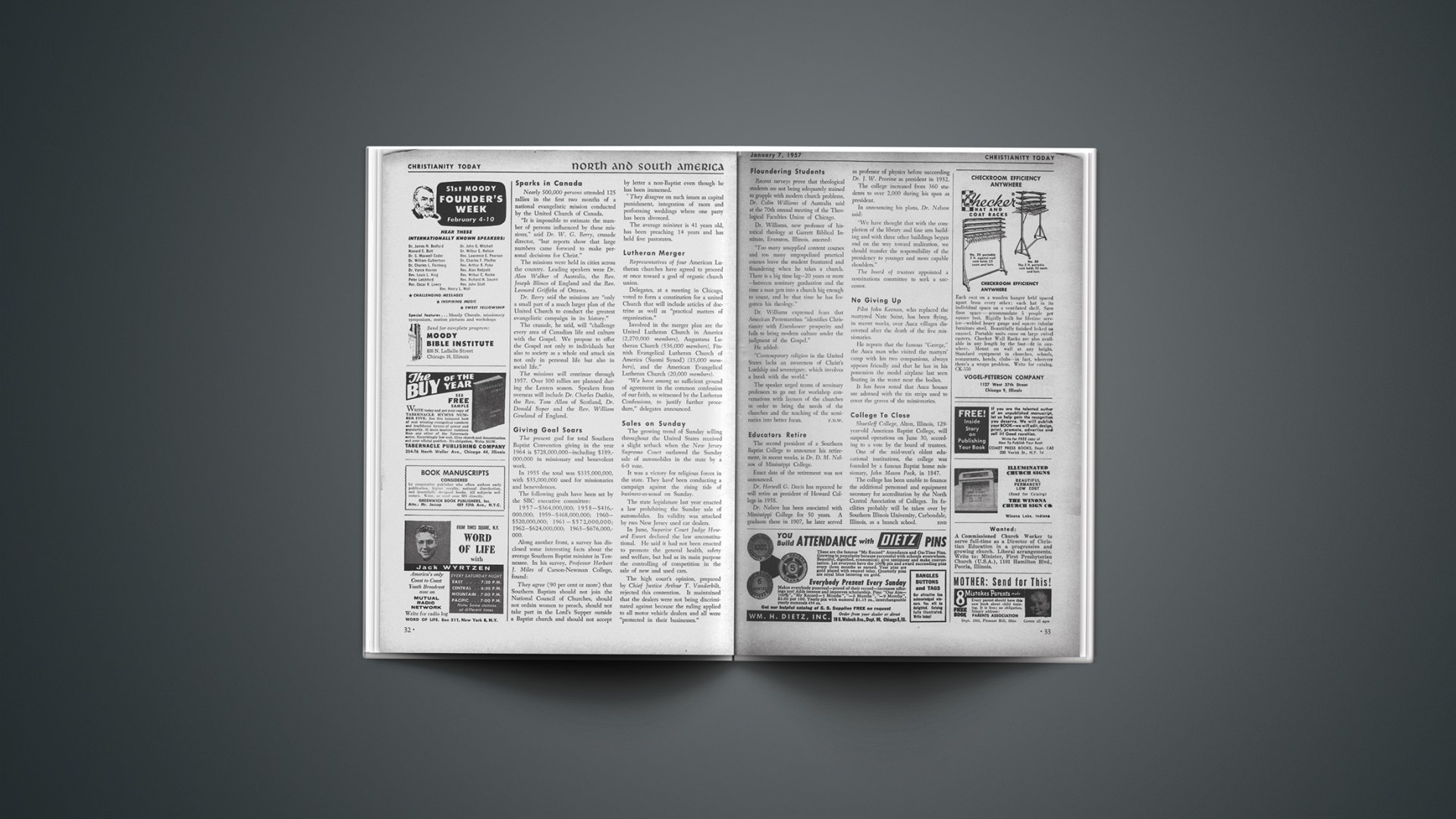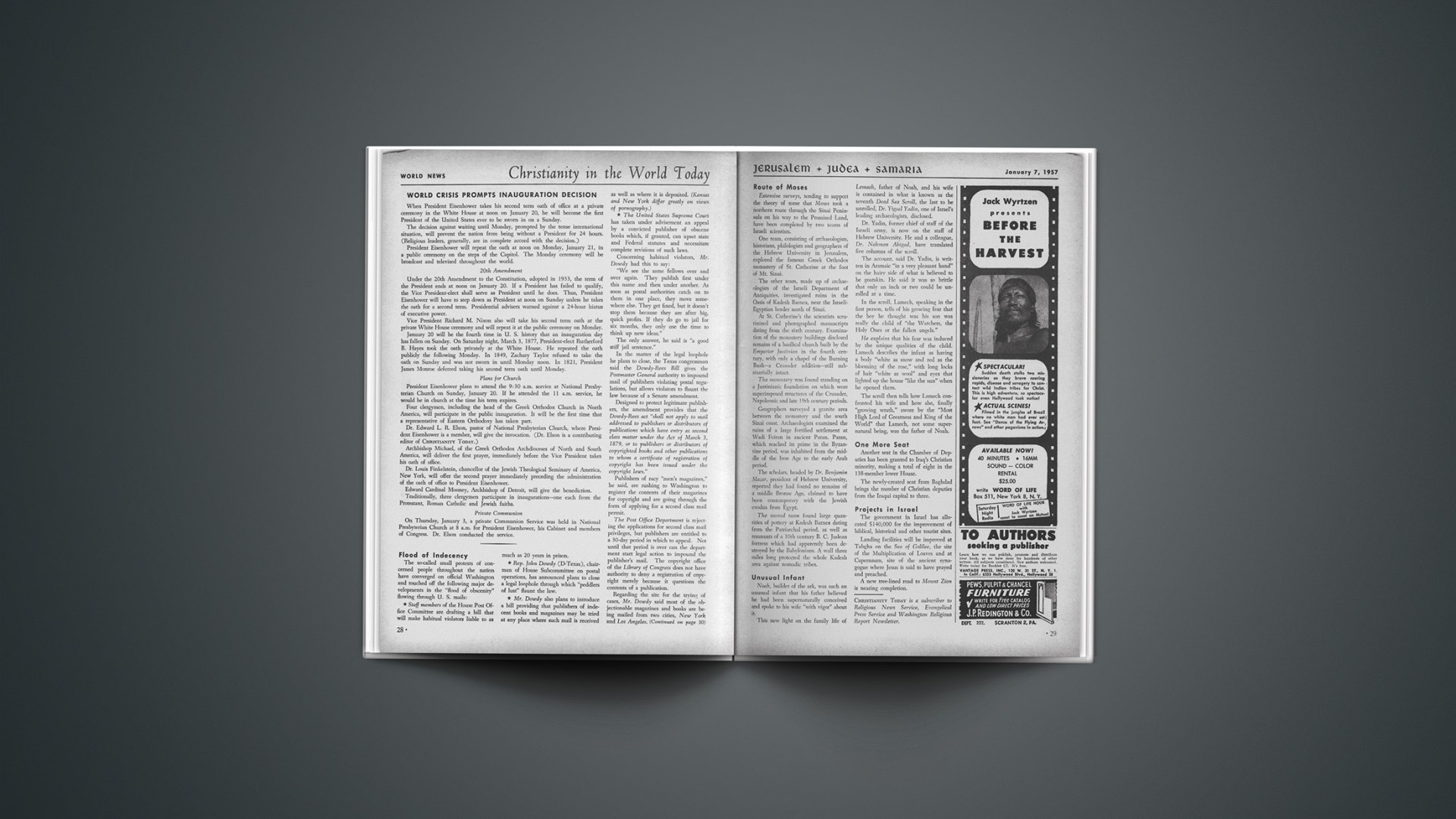There are those who believe that with the spread of communism, Christianity is a lost cause in China. Nothing could be further from the truth. I propose to deal briefly with (1) the strength of Christianity among China’s leaders and people on Formosa; (2) what has happened to the Christians on the mainland since the coming of the communists; and (3) the place of Christianity in China’s future.
Christianity In Formosa
Most of the important government leaders on Formosa, or Taiwan, are professing Christians. The President of the Republic, Chiang Kai-shek, has been an active Christian for thirty years. The story of how, brought up in a Buddhist environment, he became a Christian, is not generally known in the United States.
Shortly before the completion of China’s unification, President Chiang, who had met and fallen in love with Miss Mei-Ling Soong, journeyed to Japan where his future mother-in-law was recuperating from an illness, to ask Mei-Ling’s hand. Madame Soong was reluctant to consent to her daughter’s marriage to a non-Christian and suggested that he become a Christian.
The Generalissimo replied that he was willing to study the Bible and to become a Christian later by conviction. Madame Soong agreed to this compromise and gave her blessing to the marriage.
The announcement of the coming wedding delighted all the Christians in China. Christianity was then under serious fire in China. The Russian communist advisers attached to the National Army and the native Chinese communists were striving to launch an anti-Christian movement patterned after the anti-Christian movement in Russia.
When, shortly after his marriage, Generalissimo Chiang publicly joined a Christian church, he began a career of devout and dedicated Christianity which has continued until this day.
Other prominent government leaders on Taiwan who are Christians include Mr. O. K. Yui, the Prime Minister; Dr. Wang Chung-hui, President of the Legislative Yuan, an office corresponding to that of Chief Justice of the United States Supreme Court; General Chang Chun, chief secretary to the President; General J. L. Huang, Commander-in-Chief of the Combined Military Services; and General Ho Ying-chin, Chairman of the Strategic Advisory Board.
Madame Chiang, Mrs. Yui, Mrs. Chang, Mrs. Wang and Mrs. Ho are all earnest Christians. Mrs. Chen Cheng, wife of the Vice President of the Republic, is also a devoted Christian.
General Chiang Ching-kuo, the Generalissimo’s elder son, is also a fine Christian. The names of other prominent people on Taiwan who are Christians would sound like a roll call of outstanding Chinese. Christianity has deep roots on Taiwan.
The Christian influence has extended to the common people of the island. During Japan’s long occupation of Formosa, Christianity was barely tolerated. Only 30,000 people had accepted Christ at the end of Japanese rule. The Japanese discouraged Christianity among the 160,000 aborigines. Today, under the Republic of China, at least 20 per cent of the aborigines have become Christianized.
Today, the number of Christians on Taiwan has reached 150,000, out of a total population of ten million, or a ratio of one Christian to every 70 inhabitants. And the number of Christians is increasing rapidly. Five years ago, at a revival meeting one Sunday evening in a public park in Taipei, I was struck by the fact that more than 600 of the total audience of 800 stood up and expressed their wish to become Christians.
During the ten years Taiwan has been under Christian administration, there has been a great growth in the Christian faith. Take a walk in Taipei and you will find a church, a chapel, a Christian hospital or a mission agency within sight. There is Christian growth in the rural regions as well as the city.
The Taiwan Presbyterian Church is the oldest Christian church on Taiwan—a church that does much work among the aborigines. Established 84 years ago by missionaries from the English and Canadian Presbyterian churches, it has become the mother church of 426 Presbyterian churches on the island. Of this total, 238 are located on the plains and 198 among the aborigines.
One of the Generalissimo’s first acts upon his arrival on Taiwan was to establish a small church for his worship. For more than four years, the Shih Ling Church had as resident pastor the Rev. Chen Weiping. Eighty years old, Mr. Chen recently retired. Now the church secures different pastors to preach by invitation.
On The Mainland
How many Christians are openly maintaining their faith on the Chinese mainland, under communist rule, is not easy to estimate.
In the pre-communist period, in 1934, three years before the outbreak of the war, there were 5,493 Protestant missionaries in China, and 475,205 Protestant church members. This latter figure had increased by 1948 to 618,600. In the same year there were 2,624,166 Chinese Catholics.
The only figure known to us since the communists seized China is that 400,229 Christians signed the Christian Manifesto in September, 1950. This Manifesto was issued by the so-called National Christian Council, organized by the communists. Denominations represented were the Church of Christ, the Lutheran Church, the Episcopalian Church, the Baptist Church, the Little Flock, the Christian Meeting House, the Independents, the American Methodists, the English Methodists, the True Jesus Family, Pue Tao Hui, the Salvation Army, the Apostolic Faith Church, the Free Methodists, the Disciples, the Quakers, the Mennonites, various Pentecostal sects and 23 smaller groups.
Signing the Manifesto was obligatory for all Christians if they wished to avoid public accusations as supporters of Western imperialism. This Manifesto followed a virulent campaign of the communists against all Christian churches which were affiliated or connected with any foreign body. The major object of the Manifesto was to single out the United States for attack. According to the communists, all mission work done by any nation or Christian organization was prompted by American imperialism.
In an article in the People’s Daily, entitled “How Did Imperialism Use Religion for Aggression in China,” Hsieh Hsin-yao declared:
In the past hundred years, churches have been the bastion of the aggressors, with the latter serving as the background of the former. Whenever chances occurred for diplomatic negotiations, certain missionaries came to meddle in affairs. For instance, J. Leighton Stuart, former president of Yenching University, had posed as a religious leader and educator for many years. Outwardly he acted as if he really sympathized with China but in fact he was one of the most important secret agents for American aggression in China. Unveiling himself, he became the American Ambassador to China in order to carry out America’s aggressive policy toward China.
In his book, “China under Communism—the First Five Years,” Professor Richard L. Walker declared that “Christianity has been under attack because in communist doctrine, it represents Western Imperialism in China. No aspect of the humanitarian work of devoted Christian missionaries over the past century has been spared attack. Chinese Christian leaders activities and associations.… In a majority of cases activities and associations.… “In a majority of cases the missionaries were subjected to some combination of imprisonment, torture, house arrest, sometimes lasting for years, and public mass trial.”
I fear that at least 50 per cent of the Christians on the mainland have been driven underground by communist persecution. They dare not openly attend services. Communists keep a close tally on church attendance, and those who attend are subjected to stern discrimination. I can only guess that 50 per cent of the preachers have capitulated to Chinese communist pressure by including communist propaganda in their sermons. Sad to relate, most of the churches on the mainland have joined the so-called new order.
We can understand this apostasy, even though it hurts us. It takes rare courage for any Chinese to be a Christian in Red-ruled China today. It means that he will be treated as an outcast. Paragraph 21 of the Election Law of March 1, 1953, denies the franchise to Christians and Buddhists unless they belong to organizations that are members of government-sponsored bodies, and unless their political conduct is good.
The attack upon religion by the Chinese communists follows the historic Soviet line. Many Chinese communists in their youth undoubtedly received the benefit of education in Christian schools. Some of the Communists who have bitterly denounced Dr. J. Leighton Stuart, former American Ambassador, were students in Yenching University, a Christian institution, during his university presidency. However, sentiment is nonexistent in a communist. Once an individual becomes a communist, he must follow the communist line in his thoughts and actions.
Immediately after the communists took over, an official order was issued requiring all churches and Christian groups to register with the government if they wished to continue. At the same time a government bureau for the control of religious matters was created. Many churches and Christian groups registered with the bureau, but a few had the courage to refuse to register.
In order to centralize control over the churches, the bureau in 1950 set up the so-called National Christian Council. After issuing the Manifesto, the Council proceeded to set up what it called the Three Self-Reform Church Movement. This was a control measure designed to detach the churches from all identity with their original denominations. The “Movement” insists upon self-government, self-support and self-propagation. If a church refuses to join the “Movement,” its property is subject to confiscation by means of heavy taxation. An unaffiliated church must pay heavy land taxes. If these are not promptly paid, a fine of one-half per cent a day is imposed. Thus a church can exist in Red China only on condition that it “reforms.” When it accepts affiliation with the “Movement,” it pays either no taxes at all or extremely low taxes.
The Three Self-Reform Church Movement has made existence very hazardous for preachers. They must constantly ask themselves—what shall we preach, how shall we preach, and who shall preach? The communists have definitely answered the question, who shall preach. They declare that the preacher must be a man who stands firmly on the side of the people. Of course, the communist meaning of the term “the people” differs sharply from the meaning that free peoples accept.
The kind of directives given to the churches through the “Movement” are exemplified by an article entitled “Christians Must Oppose Imperialism and Be Patriotic” by Wang Chin-hsin, a professor in the Nanking Theological Seminary, in Tien Feng (June, 1955), a church paper published by the communists. He argues that those who oppose the Three Self-Reforms have been trying to quote the Scriptures incorrectly to suit their purposes. He condemns them for opposing the new communist church changes.
Another pamphlet, issued in Peiping, indicates that the Three Self-Reform Church Movement has caused wide confusion within the church groups themselves.
Religious magazines formerly devoted to the spread of the Gospel have also been converted into communist media of information. An instance is the Kung Po, formerly the publication of the Church of Christ in China.
As late as January, 1950, the Kung Po dared to write fearlessly in opposition to the communist evil. The change in the atmosphere in Red China may be seen in the change that has come over Kung Po since that time. The same magazine has been filled with articles equating Christianity with the Marxist doctrines. In 1951, for example, there appeared an article entitled “A Christian of the New Generation.” The writer declared that there is a lack of faith in the church of China today. This is due, he points out, to the fact that the members do not rightly understand the “People’s Principles” and that they have not cut away completely from “imperialistic doctrines.” Without doing these two things, he says, a Christian cannot develop a true love for his nation and church. He then proceeded to tell them, under four heads, what a Christian of the new generation needs.
(1) New Life—“resurrection life.” This means putting forth all one’s strength, working with every breath one draws, “to enter the New Order.”
(2) New Thinking—“Lift up your intelligence.” This means to develop a plan to carry out the principles of Marx, Lenin and Mao.
(3) New Knowledge—One should increase his knowledge. The author argued that American imperialism leads the Chinese to divide and perish, but that Mao is a brave lover of the people.
(4) New Work—Christ commanded His disciples to go into all the world and teach all nations, releasing men from bondage. This is the new work to which every Christian is called. Paul exemplified it. Today, men must follow their example, proclaiming the Gospel of Christ, namely, the establishment of world peace according to the principles of the People’s Republic.
By 1952, the Kung Po was printing a cartoon of President Truman and his Cabinet on their knees before a rat in a cage, pleading with the rat to save them (by means of germ warfare) from the just vengeance of the People’s Armies in Korea.
The picture of Red China today may be clarified by some of the remarks of the Rev. Victor D. Barnett at the Biennial Conference of the Far Eastern Council of Christian Churches at Karuizawa, Japan, in August, 1953. Mr. Barnett’s conclusion was that the State Church today is only a tool of the communist regime, although within it there are, no doubt, many of God’s own people.
He told of a pastor in Canton who, after obeying government orders publicly to accuse missionary friends and Chinese brethren, went into an inner room and wept bitterly. However, “so far as I have heard,” he states, “he is still in the State Church.” Another man, a principal of a theological seminary, who was greatly used of God in past days, is now a compromiser and an “accuser of the brethren.”
Mr. Barnett told of the more admirable group of Christians in China who have not yet bowed the knee to the communists. For example, a church in the South was told to join the Church State Organization, if it wished to continue to function. It refused. As a result, its meeting places were confiscated and ten of its leaders were imprisoned. Four of these were executed as “reactionaries,” three were released after a year of imprisonment, and three are still unaccounted for.
A certain pastor declined to join the so-called reform movement. The communists induced one of his nephews to accuse him of immoral conduct and to publish an untruthful expose of him in a State Church magazine entitled “Heavenly Wind.” The nephew later committed suicide and the pastor was stoned to death by communist terrorists.
So great is the fear in Red China that some day the communists may take the Bible away from the Christians that an “Eat the Bible Society” has been organized among the Christian students in a certain university. The purpose of the society is to require each member to memorize an assigned portion of the Bible against the day when no true Bible will be obtainable in China.
The Future In China
As to the place of Christianity in China’s future, I shall set forth my personal views. God rules in righteousness and justice. The choice must be made by each nation either for God or against Him.
There is no question that the number of Christian leaders in the Government of the Republic of China will steadily increase with time. I feel confident that we shall return to the Chinese mainland, the only question being when. Once we are back, we shall give Christianity the first place in our religious activities. Of course, the Government will not interfere in religious activities—our Constitution provides freedom of religion—but those who will direct the affairs of state will be largely Christians.
We have noted a considerable decline in Confucianism, Buddhism and Taoism. These faiths which used to dominate the minds of the people have dropped into a secondary status and will probably never recover their former importance in China. Christianity, which has so much to give, will unquestionably reach millions of new converts in China.
Communism based upon godlessness must fail, or thousands of years of recorded human history are meaningless. Once it collapses, the task of Christianity to fill the vacuum will be immense. It will be the duty of Christians to repair the ravages—spiritual and material—left by communism. With God’s help, we will be equal to the task.
A graduate of the University of Missouri in 1913, Hollington K. Tong is Ambassador of the Republic of China to the United States.

